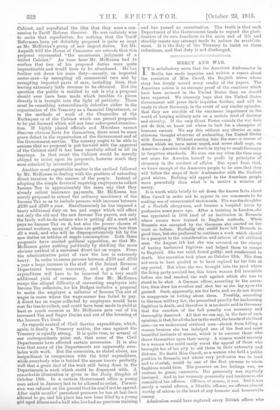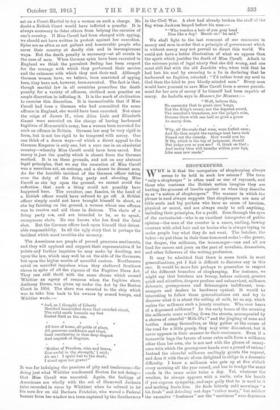MERCY AND WAR.
IT is satisfactory news that the American Ambassador in Berlin has made inquiries and written a report shoat the execution of Miss Cavell, the English nurse whose story has deeply moved every reader of the papers. The American action is no stronger proof of the emotions which have been aroused in the United States than we should have expected. We sincerely hope that the United States Government will press their inquiries further, and will be ready to show Germany, in the event of any similar episodes, that they are sensible of the enormous importance to the world of keeping military acts on a certain level of decency and chivalry. If the only Great Power outside the war does not do this, we know not where to look for a. champion of humane custom. We say this without any ulterior or mis- chievous thought whatever of embroiling the United States with Germany. Without coming into the war—a course of action which we have never urged, and never shall urge, on America—America could do much in trying to recall Germany to forgotten standards. No man can say when the time may not come for America herself to profit by principles of clemency in the conduct of affairs. But apart from that, we know enough of the American people to be sure that they
will follow the steps of their Ambassador with the liveliest good wishes. Nothing will appeal to the American people more powerfully than what is in motive a mission of mercy.
It is worth while briefly to set down the known facts about Miss Cavell in order not to appear in our comments to be making use of unwarranted statements. She was the daughter of a Norfolk clergyman, and became a hospital nurse by profession some years ago. After a training in London, she was appointed in 1906 head of an institution in Brussels where nurses were trained in English methods. When Brussels was occupied by the Germane she carried on her work as before. Probably she could have left Brussels in good time, but she preferred to continue a work which should be a passport to the consideration and esteem of all civilized men. On August 5th last she was arrested on the charge of having harboured fugitives and helped them to escape to England. She was tried, found guilty, and condemned to death. Her execution took place on October 13th. She does not seem to have quailed or to have repined for her fate at any period. But when she was brought into the yard where the firing party awaited her, this brave woman fell insensible before she had reached the wall against which she was to stand to be shot. A German officer, according to the narra- tive, then drew his revolver and shot her as she lay upon the ground. Such, apparently, are the facts, and we do not desire to exaggerate in writing about them. Possibly, according to German military law, the prescribed penalty for harbouring fugitives is death, and therefore it is nodoubt said in Germany that the exaction of the full penalty was necessary and thoroughly deserved. All that we can say, in the face of such opinions, is that, forall the law in the world, the hearts of civilized men—as we understand civilized men—shrink from killing a woman because she has indulged one of the first and most beautiful instincts of women, which is to succour those who throw themselves upon their mercy. A woman would scarcely be a woman who could easily resist the appeal of those who besought her of her pity to aid them in their extremity and distress. No doubt Miss Cavell, as a woman who held a public, position in Brussels, and whose very profession was to tend. and to cherish, would be oue of the first persons to whom fugitives would turn. The pressure on her feelings was, we venture to guess, enormous.' Her generosity was regularly besieged. And in her womanly generosity and tenderness she committed her offence. Offence, of course, it was. But it was surely a venial offence, a likeable offence, an offence almost worthy of esteem in the heart of any humane and honourable enemy.
Admiration would have captured every British officer who sat on a Court-Martial to try a woman on such a charge. No doubt a British Court would have inflicted a penalty. It is always necessary to deter others from helping the enemies of one's country. If Miss Cavell had been charged with spying, we should not have written in protest against her execution. Spies are as often as not gallant and honourable people who serve their country at deadly risk and in inconspicuous ways. But the death penalty is necessary—at all events in the case of men. When German spies have been executed in England we think the prevalent feeling has been respect for the courage with which they performed their service and the calmness with which they met their end. Although German women have, we believe, been convicted of spying here, they have not, however, been executed. The fact is that, though martial law in all countries prescribes the death penalty for a variety of offences, civilized men practise an ample discretion in inflicting it. It is the mark of civilization to exercise this discretion. It is inconceivable that if Miss Cavell had been a German who had committed the same offence in England, she would have been executed. Not since the reign of James II., when Alice Lisle and Elizabeth Gaunt were executed on the charge of having harboured fugitives of Monmouth's army, has a woman been executed for such an offence in Britain. German law may be very rigid in form, but is not too rigid to be tempered with mercy. One can think of a dozen ways—of which a direct appeal to the German Emperor is only one, but a sure one in an absolutist country—whereby Miss Cavell could have been saved. But mercy is just the quality which is absent from the German method. It is on these grounds, and not on any abstract legal principles, that we say the execution of Miss Cavell was a merciless act, an outrage, and a shame to decent men. As for the horrible incident of the German officer taking over the duty of the firing party and shooting Miss Cavell as she lay upon the ground, we cannot avoid the reflection that such a thing could not possibly have happened here. The revolver, one fancies, in the hand of a British officer would have refused to go off. A British officer simply could not have brought himself to shoot, as she lay fainting on the ground, a woman whose one offence was to receive and aid those in distress. The shots of a firing party are, and are intended to be, so to speak, anonymous shots. No one knows who has fired the fatal shot. But the German officer took upon himself that detest- able responsibility. In all the ugly story that is perhaps the incident which most troubles the memory.
The Americans are people of proved generous sentiments, and they will applaud and support their representative if he points all further inquiries he may make by dwelling, not upon*the law, which may well be on the side of the Germane, but upon the higher merits of merciful custom. Northerners acted on merciful impulses when they sheltered Southern slaves in spite of all the rigours of the Fugitive Slave Act. They can still thrill with the same shame which caused Whittier an agony of remorse when the fugitive slave, Anthony Burns, was given up under the Act by the Boston Court in 1854. The slave was escorted to the ship which was to take him back to his owners by armed troops, and Whittier wrote :— 4( And, as I thought of Liberty Marched handcuffed down that sworded street, The solid earth beneath my feet
Reeled fluid as the sea.
• All love of home, all pride of place, All generous confidence and trust Sank smothering in that deep disgust And anguish of disgrace.
•
'Mother of Freedom, wise and brave, Rise awful in thy strength,' I said; Ah me ! I spake but to the dead; I stood upon her gravel " It was for indulging the passions of pity and tenderness—for doing just what Whittier condemned Boston for not doing— that Miss Cavell was executed. Again, the feelings of Americans are wholly with the act of Stonewall Jackson (also recorded in verse by Whittier) when he refused to let his man fire on old Barbara Frietchie, who waved a Federal banner from her window in a town captured by the Southerners in the Civil War. A shot had already broken the staff of the flag when Jackson leaped before his men:— " 'Who touches a hair of yon grey head Dios like a dog! March on l' he said."
We shall fight to the last remnant of our resources in money and men in order that a principle of government which is without mercy may not prevail to direct this world. We could not have a better illustration of what we oppose than the spirit which justifies the death of Miss Cavell. Admit to the extreme point of legal nicety that she did wrong, and one must still feel with the old Jacobite who, when told that he had lost his soul by swearing to a lie in declaring that he harboured no fugitive, retorted : "I'd rather trust my soul to God than the laird to you bloody-minded men." Every man would have yearned to save Miss Cavell from a severe punish. ment for her acts of mercy if he himself had been capable of mercy, As Isabella says in Measure for Measure :— " Well, believe this, No ceremony that to great ones 'longs, Not the King's crown, nor the deputed sword, The marshal's truncheon, nor the judge's robe, Become them with one half so good a grace As mercy does.
•
Why, all the souls that were, were forfeit once; And He that might the vantage best have took Found out the remedy. How would you be, If He, which is the top of judgment, should But judge you as you are P 0, think on that ; And mercy then will breathe within your lips, Like man new made."







































 Previous page
Previous page